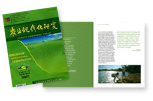- You are here: Home > Research > Research Progress
Soil Carbon sequestration can be enhanced via management practices, such as fertilization and water regime, however, the partitioning and stabilization of plant-derived C in rice paddy system under P fertilization still limited understood.
Therefore, a researcher group in the Institute of Subtropical Agriculture (ISA) of Chinese Academy of Sciences conducted an experiment to investigate the carbon assimilation by rice crop and translocate into paddy soil aggregates.
Using 13C continues labeling method, their experiment was conducted under two level of P fertilization (0 and 80 mg P kg-1 soil) and two water regime (alternate wetting and drying (AWD) and continuous flooding (CF)).
The study indicated that the recent photoassimilates associated with silt- and clay-size aggregate classes and in the mineral-associated fraction showed highest proportion with P addition and water management.
Lower values of 13C incorporation into soil was found after 6, 14, days from 13C labelling time regardless of water regime.
While after 22 days, P fertilization had positive effect on 13C incorporation into different aggregate fraction. Where, the addition of P fertilizer increased 13C incorporation into macroaggregates, microaggregates and in the silt + clay size class in comparison to no P fertilization.
Their results also supposed that carbon sequestration in paddy can be enhanced by phosphorus application due to increasing of recent photoassimilates contents in soil aggregate classes with longer residence time and also in particulate organic carbon.
The study entitled " Assimilate allocation by rice and carbon stabilisation in soil: effect of water management and phosphorus fertilisation" was published in Plant Soil .Details can be found at https://doi.org/10.1007/s11104-018-03905-x
The study was supported by the National Natural Science Foundation of China and Youth Innovation Team Project of CAS, ISA.
Contact: GE Tida
E-mail:gtd@isa.ac.cn
Institute of Subtropical Agriculture, Chinese Academy of Sciences
Address: Mapoling of Changsha City, Hunan province, P.R.China.Tel: +86-731-4615204 Fax: +86-731-4612685

